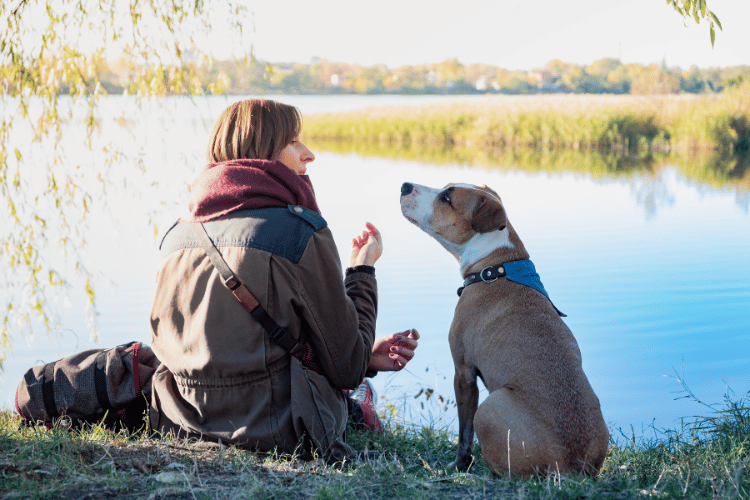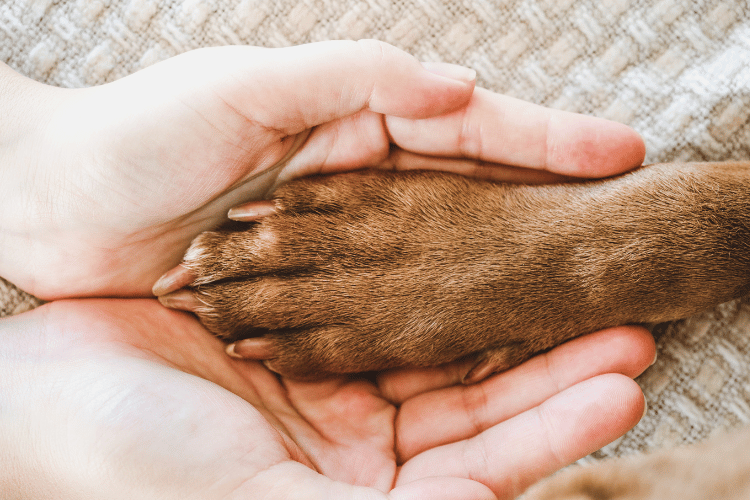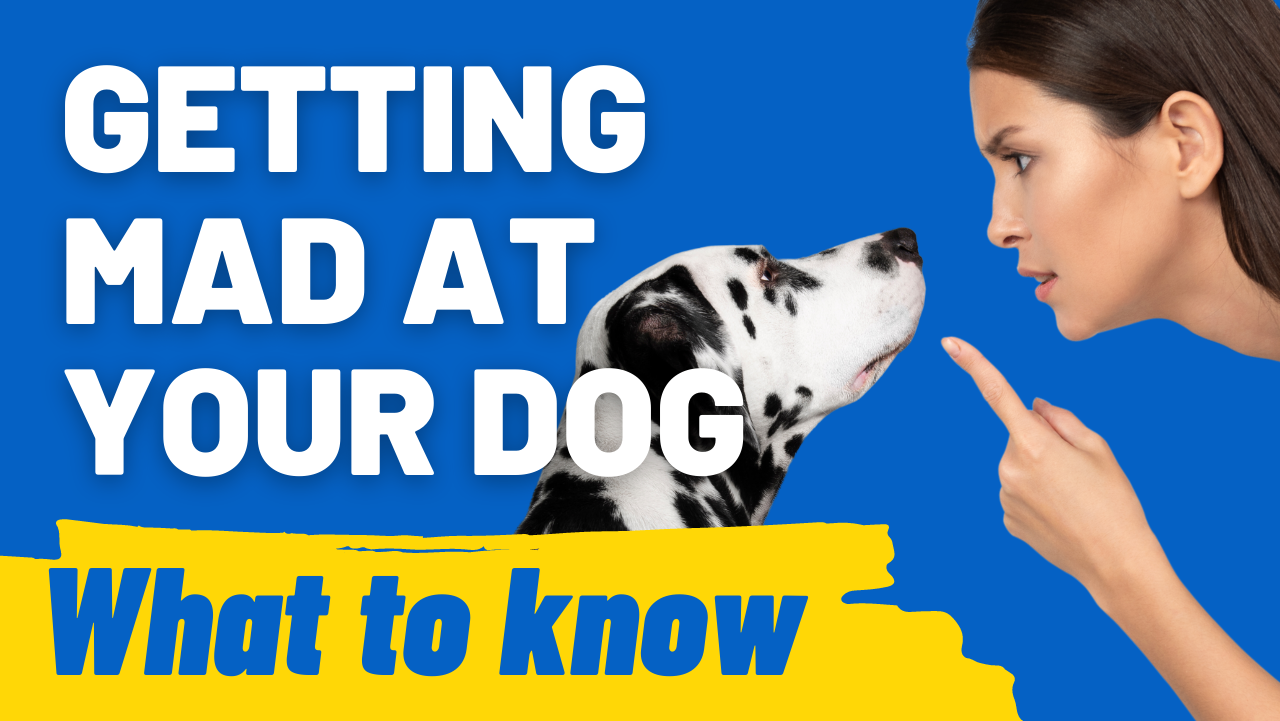Getting mad at your dog isn’t something that happens daily. It sneaks up on you after a long day at work or when you’re incredibly stressed. Or when your dog does that one thing that drives you up the wall, like barking!
Firstly, it’s ok that you get upset with your dog from time to time, because it’s normal. How you deal with it when you feel that way is what’s important.
Yelling at your dog, or doing something worse, isn’t going to help the situation at all. So this is always the first thing to remind yourself when you find yourself mad at your dog or puppy.

Is It OK to Be Mad at Your Dog?
Yes, it’s ok to be mad at your dog. What’s important is how you manage your emotions. If your dog just chewed up your favorite pair of shoes, it’s natural to be mad. But what isn’t ok is yelling, scolding, or using any violence against a dog. These actions can ruin your relationship with your dog, and can cause your dog to have anxiety.
Your dog isn’t a toy or a robot; they are a living creature bound to make mistakes like everyone else. Unfortunately, there are times when these mistakes can be frustrating, especially when they happen repeatedly! Like a dog barking for instance.
Regardless, the most important thing to remember is not to let that anger control you.
How Long Should You Stay Mad at Your Dog?
Generally, you can stay mad at your dog for about 30-60 seconds. This is because your dog, even at full maturity level, is as intelligent as a two-year-old baby!
While you might’ve had your dog for years, this doesn’t mean they actually understand what’s going on like you do.
Your dog could become upset that you’re mad at them or treating them differently, but it’ll be hard for them to connect the dots and realize why you’re angry.
It’s best to realize your dog’s behavior is natural for a dog, even if it goes against what you want as a human. So it’s best to come at the problem but thinking about how to manage their behavior.
You might like to read this post on the subject of dog discipline: How to Discipline a Puppy: The Right Way
Do Dogs Know if You Are Mad at Them?
Yes, your dog can tell when you’re mad at them. In fact, there’s a study that shows dogs can distinguish between our facial expressions to determine whether we’re happy or sad.
However, if you need a sign to figure out whether your dog knows you’re mad, look for the following:
1. Puppy-Dog Eyes
The puppy-dog eyes expression is one of the cutest your dog can make.

It’s characterized by a little head tilt, raised eyebrows, and wide eyes that stare at you with adoration.
Every time your dog makes this expression, he knows it’ll make your heart melt because of his previous experience with you. So, when your doggo feels you’re distant or cold, they may pull this face.
2. Whining or Crying
Another sign that could accompany the puppy-dog eyes is whimpering or crying.
Though it’s quite sad to see and hear, it’s one of the most common ways for dogs to show their remorse.
3. Won’t Look You in the Eye
In the canine world, long stares are usually a sign of an impending fight or challenge. And compared to your dog, you’re bigger, stronger, and louder. Therefore, you’re basically the alpha in your relationship.
When you appear stoic and angry, your dog will try to avert their eyes to avoid any conflict or fight. They’ll also place their tail between their legs and lay their ears against their head.
4. Won’t Look at the Mess Made
Just as your dog avoids eye contact with you, they’ll basically look everywhere except at the mess they created!
This is their way of hoping that if they can’t see it, then maybe you can’t either, and you’ll go back to not being angry with them.
You might like to read our post, Why Is My Puppy So Naughty? (Explained)
Do Dogs Get Upset When You Get Mad at Them?
The answer to this question is a bit complicated. Your dog will notice a change in your attitude and will try to get you engaged if you’re ignoring him.
He’ll nudge his face and bring you his favorite toys to grab your attention. However, he won’t be upset or mad at you.
This is simply because “anger” is a human emotion that dogs don’t understand. So, you won’t find your dog seeking to “get back at you” by destroying stuff for being mad at or punishing him.
You might be interested in this post of ours, I hate my puppy, will I ever love them?
What to Do When You Are Angry at Your Dog?
Before we tell you what to do when you feel angry, just remember that most of these options aren’t going to solve the problem.
They’ll help you feel calm and redirect your emotions, but they won’t help you address the root of your frustration.
To do that, you’ll need to figure out if your anger is just a reaction to your dog’s behavior or if you’re frustrated by other things in your life, like work or relationships.
Once you’ve figured out which reason it is, you can follow any of the next tips to help calm you down when you’re angry at your little friend:
1. Take a Deep Breath
When you discover that your dog has done something he shouldn’t have, you’ll naturally react with anger. You’re liable to shout, yell, or generally let your anger take control.
So, while this may sound like a cliché, taking a deep breath and stepping back can help you calm down and gain some perspective.
You’ll be able to see things more clearly and, hopefully, respond appropriately.
2. Count to Ten
Another cliché that works wonders is counting slowly from one to ten. It’s similar to the breathing technique, but it’s a bit more practical.
That’s because, in some situations, you’ll be unable to stand quiet and take deep breaths. Instead, you’ll want some sort of distraction.
So, take a breath and count out loud until you feel the anger slowly leaving your body. Also, you don’t have to count just to 10; you can keep going until you feel the fiery emotion of anger subside!
3. Get Out of the Room
A great way to de-escalate any situation is to remove yourself from it temporarily.
Just put the entire scene on pause and go read, wash the dishes, or even tidy up a little. Leave your dog to do what he pleases as well, like walking around or playing with his favorite toy.
After you finish from your own time-out, go back again and visit the problem. You’ll find that you have a much clearer head to help you handle what happened effectively.
Using place training may also be a great way to give your dog a place for a time-out while you work through your anger. You can learn how to do it at this post, Place Training a Puppy: (Guided Instructions)
4. Rethink Your Expectations
Let’s take a moment to consider your last bout of anger toward your dog. Was it justified?
There’s a chance that you could constantly be putting your dog in positions where he simply can’t meet the necessary expectations.
Whether it’s because they are a puppy or because they need more dog training, you have to reevaluate your expectations of him.
And if you think you could do with the extra training help, consider taking them to a dog trainer or getting a few sessions at home to work through any issues.
Have you read our post, The 20 Best Dog Enrichment Toys?
Is It Normal to Get Annoyed With Your Dog?
Whether it’s relentless barking, chewing your shoes, or peeing on the furniture, It’s perfectly normal to feel annoyed with your dog sometimes.
You’re human, after all, and it makes sense that you’ll want to sit down and relax after dealing with the pressures of the day.
Yet, you end up in situations where you have to discipline your dog or clean up after him. So, it’s perfectly understandable that you feel annoyed and frustrated; just don’t let that annoyance build into actions that can affect your dog.
Do Dogs Remember When You Get Mad at Them?
There’s a huge chance your dog won’t remember you getting mad at him at all.
You see, dogs don’t really have a long-term memory; they forget things within two minutes of them happening! However, they do have what we can call a strong emotional memory.
Dogs tend to associate events with specific emotions—like every time you come home after a long day, and your dog starts celebrating your return.
So, if you often get mad and punish your dog, he’ll begin associating these two things together.
You might like to also read our post, Will My Dog Remember Me?
Will My Dog Forgive Me for Getting Angry?

Thankfully, you don’t have to worry about your dog being upset or forgiving you for a long time. As we mentioned, he won’t remember this event as time passes.
All you have to do to “earn his forgiveness” is give him a treat, loads of kisses, and cuddles!
You might like to read, Does Your Dog Care When You Cry? (Explained)
To Sum Up
All you have to do is remember that your little furry friend is just a baby who doesn’t understand what’s going on or why you’re mad.
Moreover, when you find yourself getting angry, just follow our tips to calming down so you can better assess the situation. You can take a deep breath or count to ten. Then remind yourself that your dog doesn’t realize their actions are causing you to be angry.
It’s best to work through any behavioral issues your dog is having to save you from getting mad in the future.




